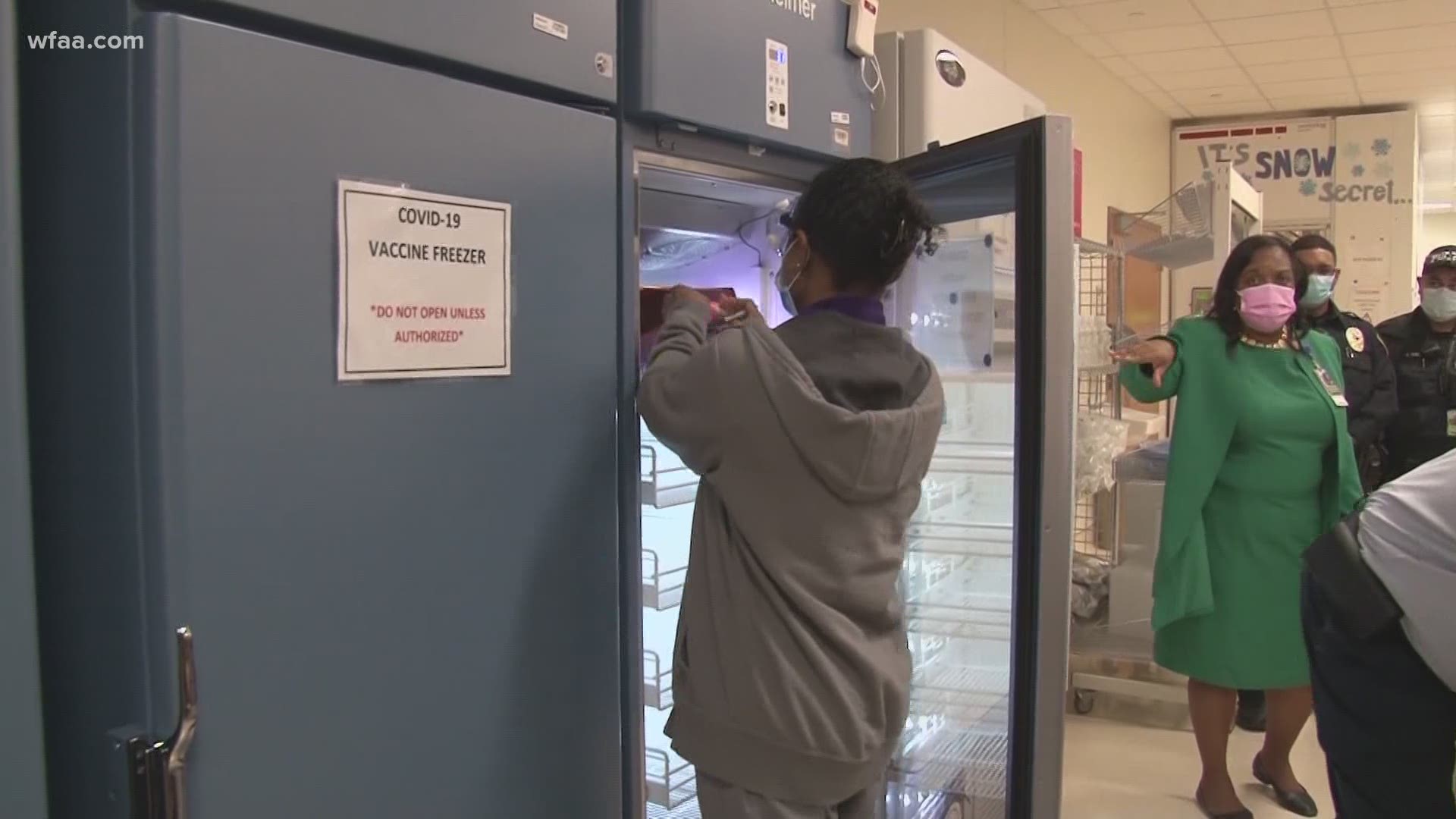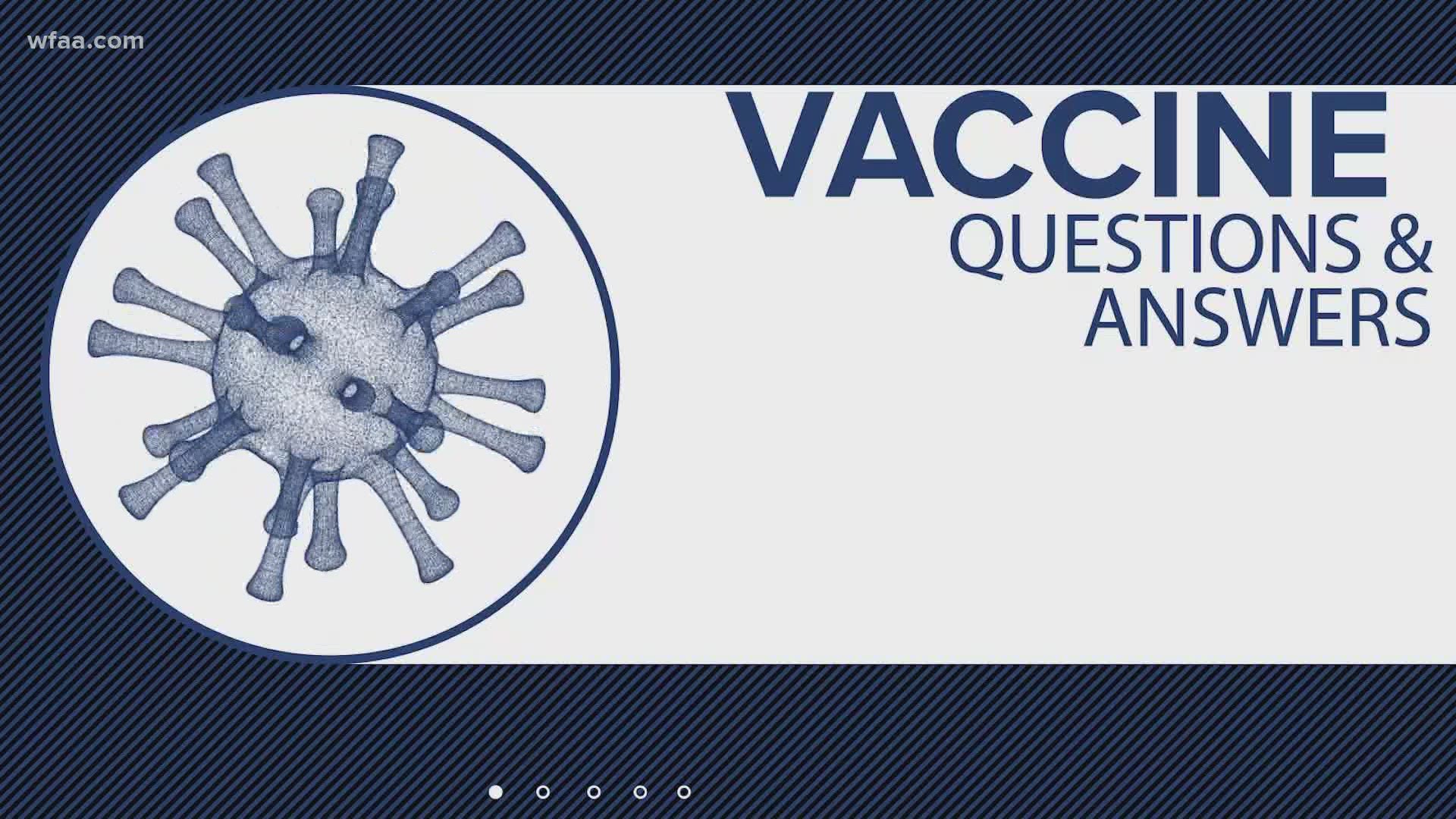Updated at 6:19 p.m. Jan. 11 to include information on vaccine sites.
Texas is changing up its vaccine distribution plan: officials are now focusing on mass vaccination hubs instead of sending doses to many providers across the state.
There will be 28 large-scale hub locations, which will serve residents to neighboring counties as well.
As a part of the plan's Phase 1B, Texans 65 years old and older and those with certain chronic medical conditions can now get the COVID-19 vaccine, according to the Texas Department of State Health Services (DSHS).
The previous group, phase 1A, included healthcare workers and first responders.
Who can get the vaccine in Phase 1B?
According to the DSHS, Texans in Phase 1B may begin receiving the COVID-19 vaccine immediately. Phase 1B includes:
- People 65 years old and older
- People 16 years old and older with at least one chronic medical condition that puts them at increased risk for severe illness from the coronavirus, including but not limited to:
- Cancer
- Chronic kidney disease
- COPD (chronic obstructive pulmonary disease)
- Heart conditions, such as heart failure, coronary artery disease or cardiomyopathies
- Solid organ transplantation
- Obesity and severe obesity (body mass index of 30 kg/m2 or higher)
- Pregnancy
- Sickle cell disease
- Type 2 diabetes mellitus
When and where can I get it in North Texas?
If you are included in the Phase 1B group, you can get the COVID-19 vaccine if your local provider has enough vaccine shots available.
On Jan. 10, Texas announced it was opening 28 large-scale hub locations. In addition, to reach smaller communities across the state, Abbott said vaccine doses would be delivered to 206 smaller locations. Go here for the list.
Dallas County is working to help vaccinate about 2,000 people per day from the site that opened at Fair Park on Monday, Jan 11.
To register for the COVID-19 vaccine, you can visit the Dallas County Health and Human Services website at https://www.dallascounty.org/covid-19/covid-19-vaccination.php.
Tarrant County Judge Glen Whitley said they would be registering residents from Ellis, Erath, Montague and Cooke counties. On Friday, Johnson County announced their residents would also be eligible to register in Tarrant County.
Dallas and Denton counties are also allowing people who are not residents to register for vaccinations.
Do you have to prove your chronic medical condition?
As of right now, there is no defined way Texas vaccination sites will require proof for someone with a chronic medical condition. It is depends on what county you live in.
For example, Tarrant County Public Health has an online COVID-19 vaccination form that, when filled out, will tell you what priority group you are a part of.
Denton County also has a COVID-19 vaccination registration website.
People who fall under the Phase 1B requirements can register at a Denton County vaccine clinic beginning Wednesday at 12:00 p.m. Pre-registration is required, and registration will close once all vaccine stock is allocated.
If you fall into this Phase 1B category and want to get a COVID-19 vaccine shot, you should contact your medical provider or doctor and ask what you need to get or do for proof.
Where can I get the vaccine?
If you are in Phase B, you can use the DSHS COVID-19 vaccine provider locations map to see if there is a provider in your area that has received a shipment of one of the vaccines.
Your ability to get a vaccine will still depend on that supply and demand, so state health officials recommend checking your provider's website, then call if your questions aren't answered.
Texas will receive more vaccine each week so people can check the online map weekly for updated information.
For information about locations that have received vaccines as well as where vaccines are available, click the DSHS link here.
What if the provider I want to go to doesn't have enough vaccines available?
Being a part of Phase 1B doesn't automatically mean the location you call will be able to give you a vaccination.
A provider has to have enough vaccine doses available, and if someone in Phase 1A still needs to get their first dose, that person takes priority.
Will there be outdoor locations to get the vaccine?
As of right now, the main vaccine provider locations in Texas take place inside and include:
- community clinic
- hospital
- local health department
- long-term care facility
- medical practice
- pharmacy
Do I have to register to get the vaccine?
No. There is no registration required to get the vaccine in Texas.
Do I need to wear a mask when I get the vaccine?
Yes. The CDC recommends people wear a mask that covers their nose and mouth when in contact with others outside your household, when in healthcare facilities, and when receiving any vaccine, including a COVID-19 vaccine.
Anyone who has trouble breathing or is unable to remove a mask without assistance should not wear a mask. For more information, visit considerations for wearing masks.
Do I need to take anything with me?
Getting one of these vaccines in Texas won't require you to show any type of documentation or proof of residency, according to DSHS.
When you go to your appointment, the CDC says to remember to cover your mouth and nose with a mask when you are around others and to stay at least six feet away from others.
What should my provider give me after getting the shot?
You should receive a vaccination card or printout that tells you what COVID-19 vaccine you received, the date you received it, and where you received it.
You should also receive a paper or electronic version of a fact sheet that tells you more about the specific COVID-19 vaccine you are being offered. Each authorized COVID-19 vaccine has its own fact sheet that contains information to help you understand the risks and benefits of receiving that specific vaccine.
If I already contract the COVID-19 virus, do I still need to get the vaccine?
The CDC says the COVID-19 vaccination should be offered to you regardless of whether you already had COVID-19 infection. You should not be required to have an antibody test before you are vaccinated.
However, anyone currently infected with COVID-19 should wait to get vaccinated until after their illness has resolved and after they have met the criteria to discontinue isolation.
Additionally, current evidence suggests that reinfection with the virus that causes COVID-19 is uncommon in the 90 days after initial infection. Therefore, people with a recent infection may delay vaccination until the end of that 90-day period if desired.
Are there any side effects?
The CDC has learned of reports that some people have experienced severe allergic reactions—also known as anaphylaxis—after getting a COVID-19 vaccine.
As an example, an allergic reaction is considered severe when a person needs to be treated with epinephrine or if they must go to the hospital.
The CDC says it is currently monitoring reports of these types of reactions and has created a section on its website explaining potential side effects.
How many times do I have to get it?
The two authorized and recommended vaccines to prevent COVID-19 in the United States both need two shots to be effective.
There is one COVID-19 vaccine in Phase 3 clinical trials in the United States that uses one shot.
Who can get the vaccine in the next phase?
State health officials have only provided specific details about these first two phases. However, the DSHS website says "spring 2021" is the best estimate for when everyone else will be able to get the vaccine. It depends on vaccine production and how quickly other vaccines become available, according to DSHS.


